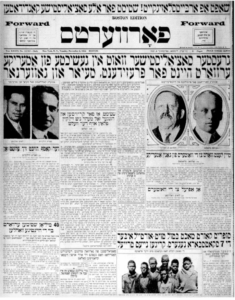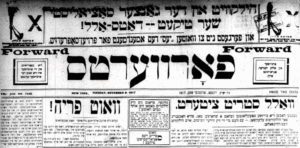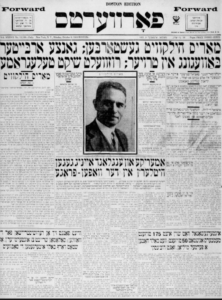A century before Mamdani, this Jewish socialist mayoral candidate divided NYC Jews
Morris Hillquit’s 1917 campaign bears striking similarities to Zohran Mamdani’s

Morris Hillquit (third from right) with the editors of The MASSES, a magazine espousing socialist views. Hillquit served as their defense lawyer when they were indicted and tried for anti-American activities. Photo by PhotoQuest/Getty Images
A socialist immigrant running for mayor on an anti-war, pro-working class platform divides New York’s Jews over whether his campaign, and potential victory, might stoke antisemitism.
The year isn’t 2025, and the man isn’t Zohran Mamdani. It’s 1917, and Jewish labor lawyer Morris Hillquit is running on the Socialist Party ticket.
While Hillquit fell well short of winning, he received more than 100,000 votes, or about 22% — over four times the Socialist tally four years earlier. He ran again in 1932, receiving about 12 percent of the vote.
Who was Hillquit, and how did his mayoral moment parallel the political currents shaping Mamdani’s rise today?
The economic parallels
Many aspects of Hillquit’s 1917 and 1932 mayoral platforms bear a striking resemblance to Mamdani’s today, according to Shelton Stromquist, emeritus professor of history at the University of Iowa and author of Claiming the City: A Global History of Workers’ Fight for Municipal Socialism.
Hillquit called for public ownership of the city’s transportation, and for the construction of affordable housing to replace substandard living arrangements. He also promised to bring down food prices, pledging to “put the milk profiteers out of business” by buying milk directly from farmers and selling it at cost.
Mamdani’s campaign has echoed many of those ideas, centering on affordability with proposals to make buses “fast and free,” freeze rents for tenants in rent-stabilized apartments, and create city-owned grocery stores.
And just as Mamdani has positioned his campaign as fighting big-money influence, Hillquit’s campaigns took on a populist tone.
“Too long have the people of New York been misruled for the benefit of bankers, franchise magnates, realty speculators, landlords, and other capitalists,” read a pamphlet distributed by the Socialist Party endorsing Morris Hillquit for mayor in 1932.
Both campaigns also drew on immigrant pride, according to Stromquist. Mamdani was born in Uganda; Hillquit in modern-day Latvia, then part of the Russian Empire, in 1869. Hillquit’s family immigrated to the U.S. in 1896, settling in a Lower East Side tenement. He dropped out of school to help support them, working in garment factories and later helping to start the United Hebrew Trades, a garment workers’ union.
Like Mamdani, “Hillquit’s campaign was singular in many ways, but at the same time, it was very much a part of a broader movement that had been growing and spreading,” Stromquist said.
Mamdani, for his part, cites Vermont Sen. Bernie Sanders — a fellow democratic socialist — as an inspiration. Sanders endorsed Mamdani and featured him on his “Fighting Oligarchy” tour, events that often draw tens of thousands of people and highlight other rising democratic socialists, including Alexandria Ocasio-Cortez. A recent poll shows socialism is more appealing to college students than capitalism.
Municipal socialism was also gaining traction in the early 20th century. In 1910, Jewish politician and journalist Victor Berger became the first socialist elected to the U.S. House of Representatives, representing a Milwaukee district. In 1913, socialists won a majority on Hamilton, Ohio’s city council and elected the mayor.
And while Hillquit lost the 1917 mayoral race, socialists still made gains in New York City that year: 10 state assemblymen, seven city aldermen, and one municipal judge were elected on the Socialist Party ticket. Of those 18 elected, 16 were Jewish.



A campaign that divided Jews
Mamdani’s positions on Israel have roiled Jews across the country, and he’s often had to defend himself against allegations of antisemitism for: refusing to outright condemn the slogan “globalize the intifada;” reiterating support for Palestinians in his statement on the Gaza ceasefire; vowing to arrest Israeli Prime Minister Benjamin Netanyahu if he visits New York; and saying he doesn’t recognize Israel as a Jewish state. He’s simultaneously built a coalition of Jews who support him.
During the 1917 mayoral election, opposition to U.S. involvement in World War I overshadowed economic concerns for many voters, according to Stromquist.
Hillquit, a pacifist, was a principal co-author of the Socialist Party’s resolution opposing U.S. entry into World War I, and he made peace a central plank of his campaign.
His stance drew fierce backlash. Opponents labeled him “a traitor and an agent of the Kaiser,” and the attacks quickly grew personal. A 1917 editorial in this publication, the Yiddish Forverts, noted that Hillquit’s “bitterest enemies wish to see him drown in the Rutger Street fountain, or hanged off a sloop on the East Side.”
Hillquit’s position split the Jewish community. Some feared anti-war sentiment would make Jews appear unpatriotic and fuel antisemitism, according to Gil Ribak, associate professor of Judaic studies at the University of Arizona and author of the paper “For Peace, Not Socialism”: The 1917 Mayoralty Campaign in New York City and Immigrant Jews in a Global Perspective.”
One newspaper editor wrote to his readers as “a Jew to Jews,” asking them if they wanted “to give a chance for our neighbors to say that we are not loyal enough to America?”
Even Supreme Court Justice Louis Brandeis weighed in, telling his colleagues at a private meeting of Zionist leadership in 1917, “I cannot help feeling myself that the pacifistic attitude of some Jews is a danger to all Jews, and some form of a pogrom would not be at all unlikely.”
Others dismissed such concerns as fearmongering and rejected the idea that Jews had to vote a certain way to prevent antisemitism. As Forward founding editor Abraham Cahan argued in this publication, “Well, if we are destined, heaven forbid, to have the antisemitic bear come at us, then let’s not give our vote to a corrupt gang.”
Ultimately, the attacks on Hillquit did not deter Jewish voters. Though he fell well short of winning office, according to Ribak, turnout for Hillquit was especially strong in Jewish neighborhoods, with the socialist candidate winning more than 60 percent of the Jewish vote in some areas of the Lower East Side.
Chana Pollack contributed research. Jacob Kornbluh contributed writing.















